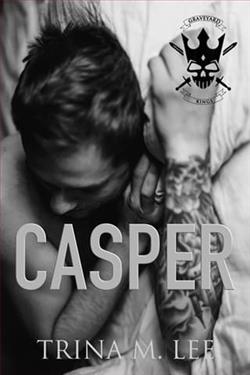Page 161 of Stuck with my Boss Daddies
Samuel, the strategist, waited until the last second before scooping one of the smaller kids onto his back and letting them “win,” which earned him a round of cheers.
Kai? He was all in, ducking and dodging, letting kids pile onto him like a jungle gym as he wrestled them to the ground.
I just stood back, watching.
Watching the way Samuel steadied the little girl on his shoulders, making sure she didn’t fall. Watching the way Kai let one of the boys tackle him, even though he could’ve easily broken free. Watching the way Sadie laughed, her whole face glowing as she cheered them on.
And for the first time, I truly thought about what it would mean to be a dad.
Not just in some vague, distant way, but really thought about it. About what it would feel like to have a kid look at me the way these kids looked at Samuel and Kai. About the responsibility of it, the weight of it.
And the love of it.
A small tug at my jeans snapped me out of it. I glanced down to see a tiny girl with big brown eyes staring up at me, arms outstretched.
“Up?” she asked, completely unbothered by the fact that we’d never met.
I huffed a laugh, then lifted her into my arms, settling her on my hip. “That what you wanted, sweetheart?”
She nodded solemnly, then rested her head against my shoulder like it was the most natural thing in the world.
And just like that, everything inside me shifted.
Yeah. I could do this.
I could see it.
And when I glanced over at Sadie, catching the way she was watching me with the sweetest gaze I’d ever seen?
I had a feeling she could see it, too.
CHAPTER FORTY-TWO
Sadie
Six months ago,this place had been a worn-down building, holding memories of the past but struggling to stay afloat in the present.
Now, as I stood in the middle of the newly painted playroom, watching townsfolk move in and out, carrying supplies, setting up furniture, and laughing together, I felt a warmth settle in my chest.
We’d done this.
My events, the fundraisers, the relentless planning—it had all paid off. Willow Creek Orphanage wasn’t just surviving anymore. It was thriving.
And I wasn’t alone.
That realization hit me hard.
For so long, I had been used to standing on the outside, watching other people have what I lost: a family, a home, a place where they belonged. But as I looked around, taking in the dozens of familiar faces, I finally saw the truth.
I had all of that now.
I swiped at a tear before it could fall and turned to find Alicia Thompson watching me with a knowing look, her arms crossed over her chest.
“Don’t you start crying now,” she said, her voice all warmth and strength. “You’ll set me off, and then we’ll both be useless the rest of the day.”
A laugh bubbled out of me. “No crying. Got it.”
She patted my cheek, then turned toward the kitchen, where Marlene Reid and Harriet Cooper were bickering over the best way to arrange the new shelves.















